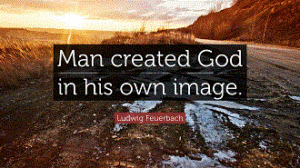
God the image of man
It was Feuerbach who was the first to make an anthropological reduction of theology, his god is made to establish man, there is no liberation of man without the negation of god. He started from the assumption that religion is the expression and cause of human alienation, he saw it like this: “man’s knowledge of God is only man’s self-knowledge and his own essence”, in a clear allusion to Hegel’s Absolute.
of theology, his god is made to establish man, there is no liberation of man without the negation of god. He started from the assumption that religion is the expression and cause of human alienation, he saw it like this: “man’s knowledge of God is only man’s self-knowledge and his own essence”, in a clear allusion to Hegel’s Absolute.
His analysis of the religious attitude and the concept of alienation, Feuerbach influenced the socialist thinkers of the 19th century, especially Karl Marx, is among others (called Old Hegelians) a transition between Hegelian idealism and historical materialism.
Its analysis is important because many today reaffirm this idea that it is the material basis that constitutes man’s consciousness, the consciousness of God is the consciousness that man has of himself, the knowledge of God is the knowledge that man has of himself even so god of prosperity and who gives human material goods is Feuerbach’s god.
This is also present in contemporary religions, a god of power and wealth.
We have already elaborated that Hegel’s god of the Absolute is not relation and therefore not Trinitarian.
His reading is: ““the hermeneutic key that the author uses to understand religion is the following: religion is anthropology, ‘theology is anthropology’, so what man says about God, through religious language, is nothing else. than a confession of his aspirations and projects”, however it is God who creates to satisfy only immediate human needs.
This does not mean a God in nature who does not know man, otherwise the figure of Jesus would just be a superior being with no relation to man, including his human needs.
The Hegelian world created this selfish and merely human face, where gifts and divine asceticism do not exist.
Feuerbach, Ludwig (1988) A essência do cristianismo. Brazil, Campinas: Papirus, 1988.









